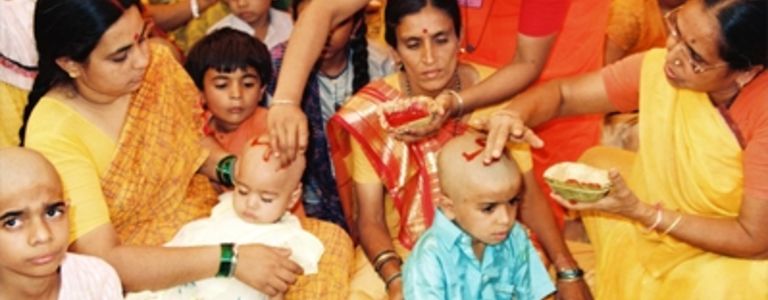Paul Carvel the famous Belgian writer has so rightly said, “To witness the birth of a child is our best opportunity to experience the meaning of the word MIRACLE”
The birth of a new born child at home or at the home of a closer one is one of the happiest moments in life. Sharing our love and happiness with the new parents, or as parents the love we get from everyone around is a true blessing.
Suddenly,chaos at home, coochicooing sounds, the happiness we feel at the soft sounds of a baby crying and the never ending flow of visits from family and friends who have come to bless the child are a refreshing welcome. The whole home is filled with the deliciously comforting scent of the new baby. PURE BLISS.
With the birth of a child a lot of varied traditions are followed by different cultures/ religion. Additionally, Hinduism is a huge complex religion with many variations in traditions, ceremonies, beliefs and rituals.
Rituals are evidence that one is authentic and belongs. They are about knowing where you come from. They provide an immediate sense of connection as well as an inclusion into the clan or community. With these rituals, we as parents try to provide the child with a road map home.
Hindu rituals (sanskaras) begin even before a child is born. Soon after marriage, a prayer called GARBHADANA (conception) is recited for the fulfilment of parental obligation. During the 7th month of the pregnancy the GODHBHARAI (commonly known as baby shower) is another important ritual which means satisfying the cravings of the pregnant mother. Once the child enters the world JATAKARMA is performed by putting some honey in the child’s mouth and whispering the name of the God in his ear. Other rituals include a naming cermony, NAMAKARNA. The child’s first trip out, NISHAKARMANA. The child’s first taste of solid food, ANNAPRASANA. The ear piercing cermony, KARNAVEDHA. The first hair cut, MUNDAN and finally the sacred thread ceremony performed when the boy child reaches school going age, UPANAYANA are all highly significant rituals.

The mundan or head shaving is connected to the removal of impurities. The shaving off of the first hair is celebrated in a big way. This has more cultural connect than a physiological one.
It is a purification act performed in order to ensure that the baby is cleansed of all the undesirable elements of passing through the earlier births, a gesture to purify the soul from the previous Yonis.
Another aspect is that the tonsure triggers off the flow of intelligence and enhances the flow of knowledge in the life of the child.
The hair on the child’s head is formed in the womb of the mother and it is believed to have a bad influence on his development as he grows.
Many believe that shaving the head will make new hair grow stronger, but no evidence to back this theory has been found.
It comforts the baby and opens the head’s skin openings and along with this it is said to strengthen his eyesight, his sense of smell and hearing
During childbirth and effects of the pressure the baby feals the scalp develops a lot of gaps which have to be filled naturally. One way to get it done is to expose the head to Vitamin D, the best source of which is sunlight. This may be one of the reasons most religions insist on the tonsuring of a babies head, allowing it to be exposed to sunlight.
Apart from skull development, tonsure helps in stimulating a healthy blood flow, enhances brain development, nervous systems and relief from headaches and pains caused during teething.
Many may not agree to the above reasons. Some may even find a few reasons outdated. Whats right for one may not be so for the other. My appolgies to the readers who may not agree. Do share in your inputs on your reasons for / not tonsuring.
Comments